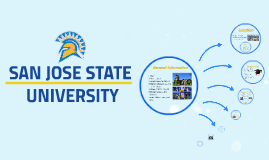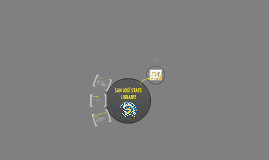San Jose State
Transcript: Financial Aid Class Standing: Sophomores, Juniors, Seniors, and above GPA: A minimum of 2.75 cumulative GPA Lower/Upper Division: Complete lower division requirements and WST to take upper division abroad. Other Pre-requisites: Determined by your major department or host university/program. Exceptions: Students who do not meet GPA or other requirements should talk with a study abroad advisor first before applying Exceptions may be granted on a case by case basis. Programs include: Bilateral Exchanges, CSU International Programs, ISEP Summer Programs, and Faculty-Led Overseas Courses. One program is not better than others, every student is different and has different goals. Factors include: program location, available classes, program length, program cost, etc. Steps to Study Abroad Studying abroad is fun, but also challenging! Study abroad students are responsible, open-minded, self-motivated, and eager to learn and challenge themselves. Students are expected to have what it takes to research programs independently, adapt to a new system of education, support themselves financially, and get through the challenges of living in another country including culture shock and homesickness. Students with any medical or other concerns should discuss their study abroad plans with their medical professional and family before applying. SJSU courses taught abroad by a SJSU faculty member over the summer and winter sessions. Classes vary by year. Duration: Winter programs 2-3 weeks, Summer programs 3-8 weeks. Costs vary by program but range from $2,500-$5,000 Example courses: COMM 161F: Communications & Culture taught in China BIOL 101/GLST 188: Food, Culture & Commerce taught in France Studying abroad consists of the following costs: Tuition (varies between programs) Room and Board (varies by location) Airfare (varies by location) Health Insurance (~$12/week) Passport and Visa Personal expenses (traveling, entertainment, etc.) Other expenses – emergencies, lost luggage, etc. Outline SJSU’s reciprocal exchange relationship with other universities – 17 countries with 28 universities. Semester or Year-long exchanges. You compete with SJSU students only. Most students have a good chance of placement. Housing is up to you. Your host university will email you housing information upon acceptance. As these exchanges must be kept in balance, certain locations may become temporarily unavailable during times of imbalance. You have to speak another language Studying abroad is too expensive Studying abroad will delay your graduation* *This is not true if you plan ahead of time Introduction Education Abroad is a way for students to take classes in a different country while earning credit in their home country. Why study abroad? It’s an opportunity to take unique classes in another country. You get to learn about other cultures and languages firsthand. It looks great on your resume or graduate school application as it shows you have a global perspective and understanding . It’s a great way to make friends from around the world and build an international network. Faculty-Led Overseas Courses Managed through the Chancellor’s office in Long Beach, CA. This is open to all CSU students and students must attend a short interview on their campus as part of the application process. 18 countries, some with multiple locations. Each location works differently. Academic Year option only. No semester option available. All programs leave in Fall except for Australia & South Africa. Questions? Academics Program Types To go abroad in the FALL – APPLY before: - Bilateral: March 1st - CSU: December 15th To go abroad in SPRING – APPLY before: - Bilateral: October 1st - CSU Australia/South Africa: May 1st Deadlines for WINTER and SUMMER Faculty-Led Overseas Courses and SUMMER ISEP Programs vary each year. This presentation was the first step. From here, you must research the programs and narrow down your ideal choice based on location, cost, length, available classes, etc. Meet with your academic advisor before applying. Read everything and prepare early! You are responsible for knowing the information and submitting your documents by the correct deadlines. Student Expectations Every class you take abroad will transfer back as SJSU resident credit and will appear on your transcript. While abroad you must maintain SJSU full time status which is at least 12 SJSU units a semester. Undergraduates can take a max of 15 units a semester and can petition for up to 18 units on a case by case basis. Credit/No Credit options are available for non-major, non-minor, and non-GE classes, but you must get your major advisor’s signature as the class begins. You can easily get credit for General Education Area V – Global Cultural Understanding while abroad. ISEP Summer Programs Introduction to Education Abroad Eligibility and Expectations Study Abroad Myths Costs, Financial Aid, and Scholarships Academics, Credit, and Grades Program Types The Steps to Study Abroad

















